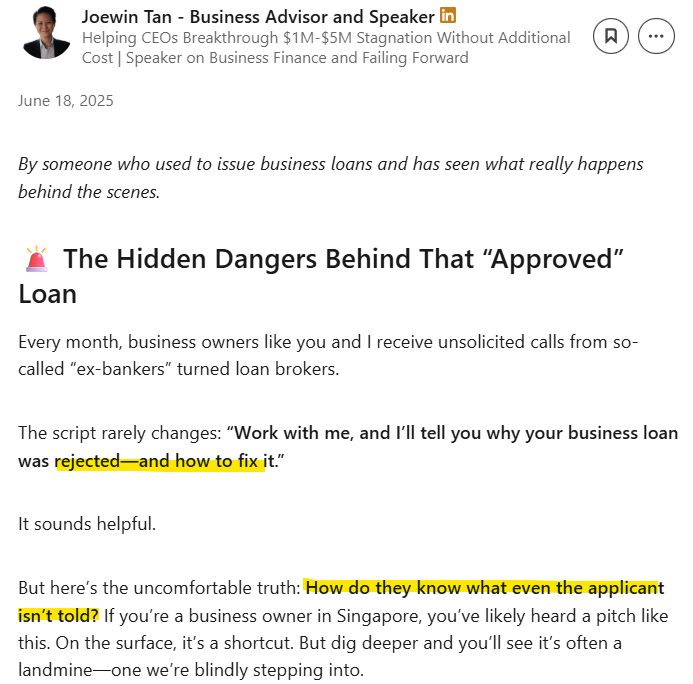Linkflow capital - We checked it out for you.
Written at: 06 Oct, 2025
Linkflow Capital is one of Singapore’s better-known SME loan brokerages. Founded by former bankers, the firm positions itself as an independent advisory that helps business owners secure working capital, trade financing, and equipment loans. It presents a familiar promise: professional guidance, wide lender coverage, and faster approvals. On paper, this sounds like exactly what most SMEs need. But as with all loan brokers, the question isn’t what they claim to do — it’s how they actually operate behind the scenes.
The company markets itself as independent and transparent, offering free loan assessments and quick pre-qualification. Its website highlights an “unbiased advisory process,” suggesting neutrality between lenders. In theory, that’s possible. In practice, independence depends on which banks or financiers a broker partners with and how they are compensated. The reality is that no broker is fully neutral when incentives differ across lenders.
What gives Linkflow credibility is its team composition. Many of its advisers are former SME bankers familiar with how banks evaluate credit risk, cashflow, and collateral. That knowledge can be valuable for small business owners who often struggle to meet documentation standards.
Linkflow’s strength lies in human expertise, not automation. But human judgment is also shaped by what the system rewards. Commission-based pay remains the norm, meaning brokers get compensated when loans close — not necessarily when borrowers get the best deal. This structure encourages efficiency but doesn’t guarantee transparency. A broker may prioritise lenders that pay higher commissions or process deals faster. That doesn’t make the broker unethical, but it does mean neutrality is an assumption rather than a certainty as our review of Lendingpot, MoneySmart, Lendela, Roshi, and SingSaver reveals how weak regulation continues to let such problems thrive. As for loan brokers like Smart-Towkay & SmartLend, we even documented lies to borrowers with screenshots.
Globally, regulators have long recognised this tension. After the 2008 financial crisis, the US introduced the Dodd-Frank Act to reform the Truth in Lending Act (TILA) and curb broker compensation structures that encouraged steering borrowers into costlier loans. Yet, even with regulations, old habits persist. In 2024, a Reuters report on United Wholesale Mortgage (UWM) being sued by consumers for billions in excess fees revealed that borrowers alleged brokers were nudged to send clients exclusively to one lender, even when better offers existed. That case underscored a fundamental truth — incentives matter, and transparency only works when oversight does.
Singapore has no comparable licensing or disclosure framework for SME loan brokers. That gap leaves borrowers to self-protection. Before taking advice at face value, ask direct questions: Which lenders were approached? Which were excluded? Examine their claims.

(Credit:This is a LinkedIn post made publicly available.)
To Linkflow’s credit, its banking background allows it to assist borrowers who might otherwise struggle to access financing. The firm’s team can interpret financials, advise on documentation. That practical experience is valuable — but it doesn’t automatically mean every recommendation is fully impartial. Borrowers should still document comparisons and keep written records of all loan offers received.
For SMEs that rely on brokers, education is still a strong defence. Our article, Loan Brokers: 10 Insider Tips Every SME or Borrower Should Know, outlines how to assess broker neutrality and interpret “free advisory” offers. It explains why transparency matters and how subtle filtering — even without intent — can shape the advice you receive.
In our breakdown, What Is a Loan Marketplace and How Are You Different from a Comparison Website or from Using a Broker, we explain how our loan marketplace removes hidden filters by sending one application to multiple lenders. That difference matters. Instead of relying on a broker’s undisclosed shortlist, you receive actual offers from many lenders directly in one application you conduct yourself.
For SMEs, speed matters — but clarity matters more. Linkflow Capital may be a capable and experienced broker, but the system it operates in remains opaque. Until broker incentives become regulated, borrowers must rely on awareness rather than trust alone. Understanding how advice is shaped — and where it might be limited — is the simplest way to avoid paying for convenience with hidden costs. You can also negotiate with them to approach some lenders yourself, using our software. That means for some loans you do not have to pay them a commission at all.
—
If you found this analysis helpful, share it with other business owners comparing financing options. Every like or comment here helps the algorithm surface borrower-education content instead of ads. Subscribe to our LinkedIn newsletter here or follow us on Medium for more evidence-based insights drawn from ongoing reviews of Singapore’s lending ecosystem.
Share on:



